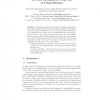WOTE
2010
14 years 12 months ago
2010
150
click to vote
WOTE
2010
14 years 12 months ago
2010
According to international law, anonymity of the voter is a fundamental precondition for democratic elections. In electronic voting, several aspects of voter anonymity have been id...
126
click to vote
WOTE
2010
14 years 12 months ago
2010
Abstract. While electronic elections promise the possibility of convenient, efficient and secure facilities for recording and tallying votes, recent studies have highlighted inadeq...
WOTE
2010
15 years 13 days ago
2010
Abstract. In this paper, we study the problem of simultaneously achieving several security properties, for voting schemes, without non-standard assumptions. More specifically, we ...
113
click to vote
WOTE
2010
15 years 13 days ago
2010
Optical mark-sense scanning has lead to a resurgence in the use of paper ballots in the United States, despite a century of strong competition from paperless direct-recording votin...
WOTE
2010
15 years 13 days ago
2010
Abstract. This paper presents a method for adding end-to-end verifiability to any optical-scan vote counting system. A serial number and set of letters, paired with every candidat...
120
click to vote
WOTE
2010
15 years 13 days ago
2010
We present a K-out-of-L voting scheme, i.e., a voting scheme that allows every voter to vote for (up to) K candidates from a set of L candidates. The scheme is receipt-free, which ...
WOTE
2010
15 years 13 days ago
2010
This article presents an ‘end-to-end’ integrity verification mechanism for use in minimally equipped secret paper-ballot election environments. The scheme presented in this pa...
113
click to vote
WOTE
2010
15 years 13 days ago
2010
Abstract. In this paper, we develop methods for constructing votebuying/coercion attacks on end-to-end voting systems, and describe votebuying/coercion attacks on three proposed en...

